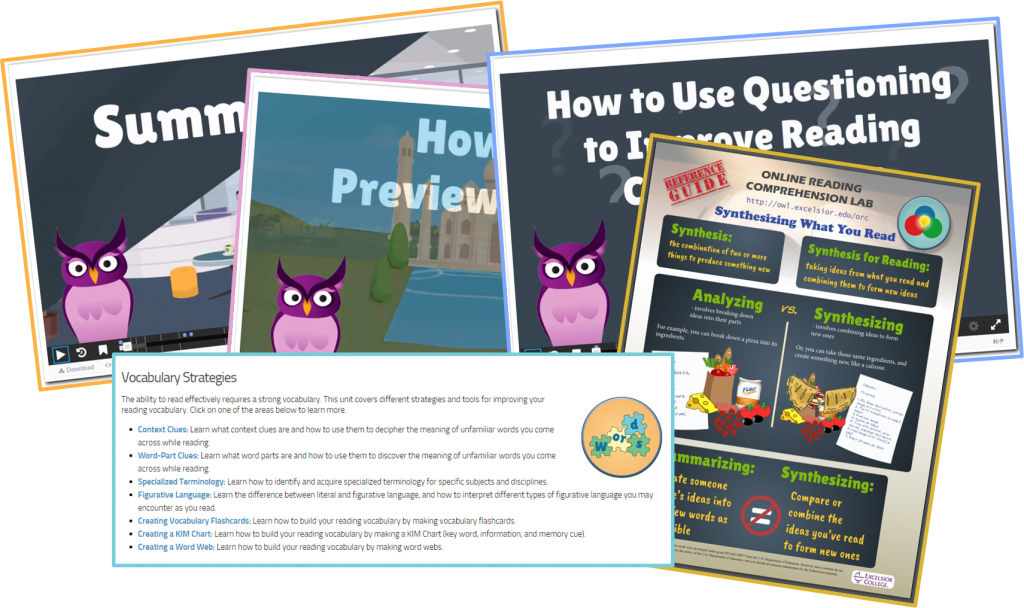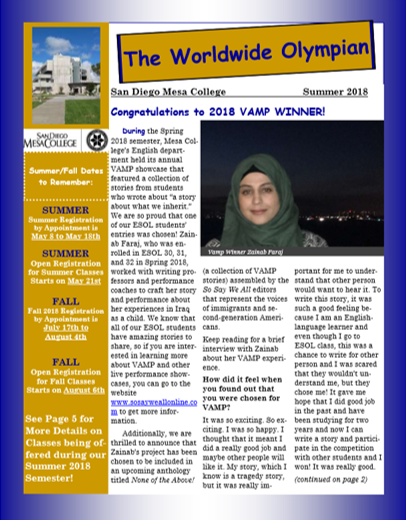Reading for College Success! Using the ORC for an English for Speakers of Other Languages Intermediate Reading Course
by Christie Allred
 The more I use OER’s (open educational resources), the more I feel better about not only saving students money, but really having up-to-date and reliable textbook sources for students. The Excelsior Online Reading Comprehension Lab (ORC) is no exception. I mean, who doesn’t love free, especially when free is a source that is as comprehensive and accessible as a textbook? So, as soon as I got my assignment to teach an English as a Second Language (ESL) Intermediate Reading course, I turned to the ORC.
The more I use OER’s (open educational resources), the more I feel better about not only saving students money, but really having up-to-date and reliable textbook sources for students. The Excelsior Online Reading Comprehension Lab (ORC) is no exception. I mean, who doesn’t love free, especially when free is a source that is as comprehensive and accessible as a textbook? So, as soon as I got my assignment to teach an English as a Second Language (ESL) Intermediate Reading course, I turned to the ORC.

My students were reading Enrique’s Journey (the young reader’s edition) by Sonia Nazario, watching YouTube videos, and reading articles selected by different groups in the class each week. I decided to use both the traditional and flipped method to teach the class. Sometimes, they would be assigned pages or sections of the lab to read at home, and then we would practice those strategies with articles read and annotated in the classroom (flipped). Other times, I would cover the material in class in a traditional way and then pass out an article for them to read and annotate at home. Both methods proved to work nicely with the ORC. Since it was the first time I used the ORC as a text, I decided I would just go in order of the pages presented and then go back for review as needed. I added links to the ORC pages that we were using on my Blackboard page so that students could reference the pages for homework assignments. The students loved that they could access material from their phones, from campus computers, or from home.
With second language students it’s so hard to determine if they are comfortable with technology and whether or not they will use an online resource. Additionally, in a classroom with only one computer, I wasn’t sure how we would cover the material in class. To answer my question about technology and language learners, I sent out an informal online survey with questions like “Are you comfortable reading material online?” or “Have you ever studied online or done an online class in English?” Most rated their online experiences as a 3 or 4 out of 5. I never officially polled them at the end of the semester, but the two areas of the OWL that they found most helpful as language learners were the sections on Summarizing and Vocabulary Strategies. They also found the sections on Previewing, Questioning, and Synthesizing to be very useful. I even had them use these strategies for test-taking. We would preview the test, look at vocabulary, and review strategy to apply to test-taking skills.

My guess is that as language learners my ESL students struggle not with understanding, but with expressing and making connections between the texts and their own lives. Once they looked at examples from the ORC and made connections through editorials and memoirs, they opened up and applied the concepts. The text we were reading was a journalistic and dramatic look into a boy’s immigration through Central America to the United States in search of his mother, whom he hadn’t seen in 9 years. After practicing summarizing and synthesis, they told their stories. It was powerful and incredible to hear about how they came to the United States. Our campus has an ESOL newsletter, and three of my intermediate students had their stories published in this newsletter. We then used their stories from the newsletter to practice ORC strategies for summarizing, synthesizing, and questioning. At first, I was worried that the language would be too much for them or the concepts would contain vocabulary for which they were unprepared. However, my fears were quickly allayed as I saw them engage and appreciate the simplicity, but effectiveness of using the ORC.
Christie Allred is an English Professor and the Puente Co-Coordinator at San Diego Mesa College and serves on the OWL Advisory Board. She is also a member of the OWL Outreach Team and will be presenting the OWL at multiple national conferences during the next two years.

